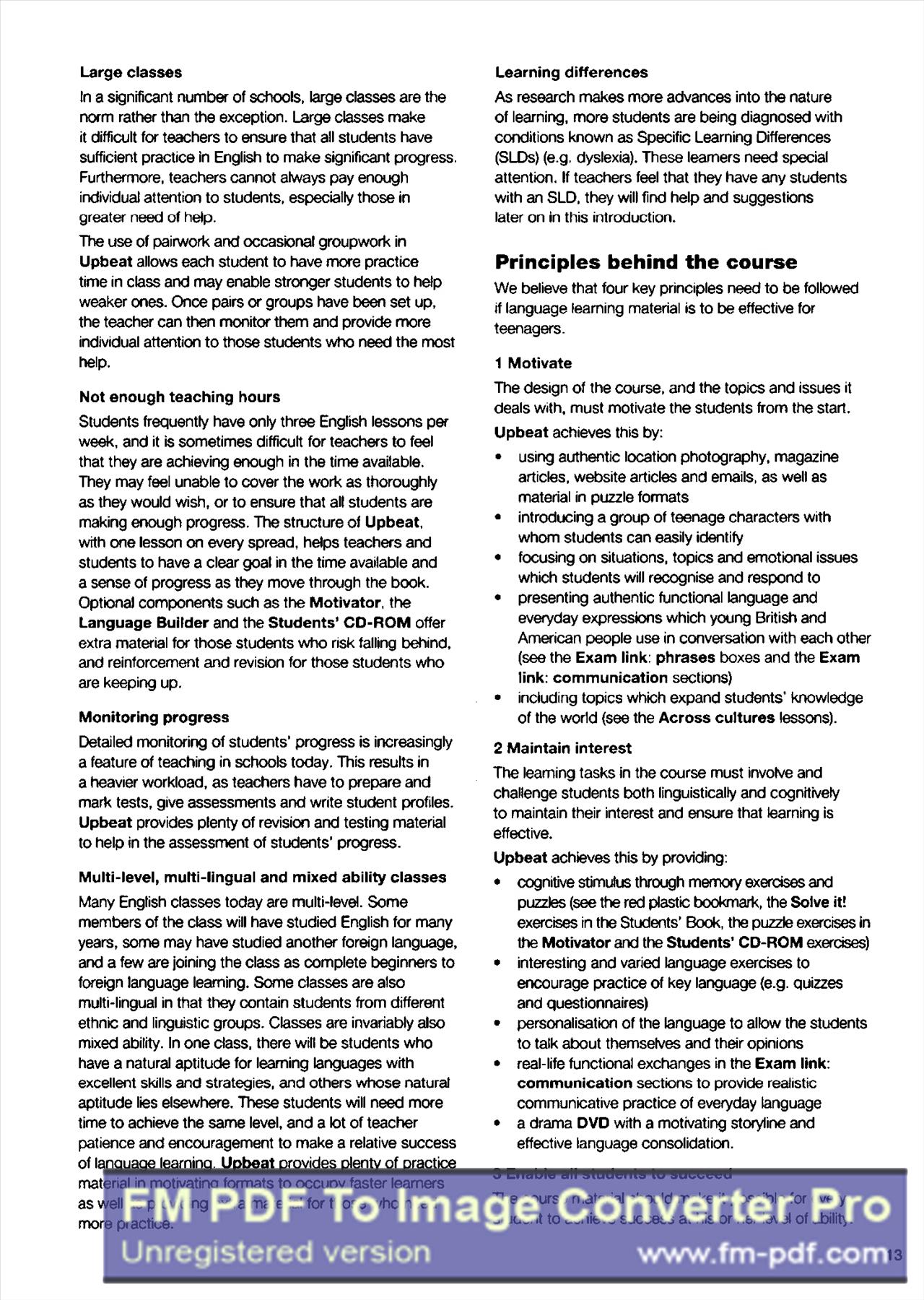Up¾at 3 Teacher's Book podrecznik nauczyciela plus odpowiedzi ,testy,klucz answer key Page 012

Large classes
In a significant number of schools, large classes are the norm rather than the exception. Large classes make it diffictilt for teachers to ensure that all students have sufficient practice in English to make significant progress. Furthermore, teachers cannot always pay enough individual attention to students, especially those in greater need of help.
The use of pairwork and occasional groupwork in Upbeat allows each student to have morÄ™ practice time in class and may enable stronger students to help weaker ones. Once pairs or groups have been set up, the teacher can then monitor them and provide morÄ™ individual attention to those students who need the most help.
Not enough teaching hours
Students frequentfy have only three English lessons per week, and it is sometimes difficult for teachers to feel that they are achieving enough in the time avai!ab!e. They may feel unable to cover the work as thoroughly as they would wish, or to ensure that all students are making enough progress. The structure of Upbeat. with one lesson on every spread, helps teachers and students to have a elear goal in the time avai!able and a sense of progress as they move through the book. Optional components such as the Motivator, the Language Builder and the Students’ CD-ROM offer extra materiał for those students who risk falling behind, and reinforcement and revision for those students who are keeping up.
Monitoring progress
Learning differences
As research makes morÄ™ advances into the naturÄ™ of learning, morÄ™ students are being diagnosed with conditions known as Specific Learning Differences (SLDs) (e.g. dyslexia). These leamers need special attention. If teachers feel that they have any students with an SLD, they will find help and suggestions later on in this introduction.
Principles behind the course
We believe that four key principles need to be followed if language learning materiał is to be effective for teenagers.
1 Motivate
The design of the course, and the topics and issues it
deals with. must motivate the students from the start.
Upbeat achieves this by:
• using authentic location photography, magazine articles, website articles and emails, as well as materiał in puzzle formats
• introducing a group of teenage characters with whom students can easily identify
• focusing on situations, topics and emotional issues which students will recognise and respond to
• presenting authentic functional language and everyday expressions which young British and American people use in conversation with each other (see the Exam link: phrases boxes and the Exam link: communication sections)
• including topics which expand students' knowledge of the world (see the Across cultures lessons).
Detailed monitoring of students' progress is increasingly a feature of teaching in schools today. This results in a heavier workload, as teachers have to prepare and mark tests, give assessments and write student profiles. Upbeat provides plenty of revision and testing materiał to help in the assessment of students' progress.
2 Maintain interest
The learning tasks in the course must involve and challenge students both linguistically and cognitively to maintain their interest and ensure that learning is effective.
Upbeat achieves this by providing:
^ # f for * frcITTTTr
iu_..ttOwiifc

•„

Multi-level, multi-lingual and mixed ability classes
Many English classes today are multi-level. Some members of the class will have studied English for many years, some may have studied another foreign language, and a few are joining the class as complete beginners to foreign language learning. Some classes are also multi-lingual in that they contain students from different ethnic and linguistic groups. Classes are invariably also mixed ability. In one class, there will be students who have a natural aptitude for learning languages with excellent skills and strategies, and others whose natural aptitude lies elsewhere. These students will need morÄ™ time to achieve the same level, and a lot of teacher patience and encouragement to make a relative success of
as well “ p . ng • morę pi actLe.
cognitive stimufus through memory exerdses and puzzles (see the red plastic bookmark, the Solve it! exercises in the Students’ Book, the puzzle exerctses in the Motivator and the Students’ CD-ROM exercises) interesting and varied language exercises to encourage practice of key language (e.g. quizzes and questionnaires)
personalisation of the language to alfow the students to talk about themselves and their opinions real-life functional exchanges in the Exam link: communication sections to provide realistic communicative practice of everyday language a drama DVD with a motivating storyline and effective language consolidation.
i of Jbilih>
rwV,
13
Wyszukiwarka
Podobne podstrony:
Up?at 3 Teacher s Book podrecznik nauczyciela plus odpowiedzi ,testy,klucz answer key Page 055 Vocab
Up?at 3 Teacher s Book podrecznik nauczyciela plus odpowiedzi ,testy,klucz answer key Page 079 1 a S
Up?at 3 Teacher s Book podrecznik nauczyciela plus odpowiedzi ,testy,klucz answer key Page 096 8Voca
Up?at 3 Teacher s Book podrecznik nauczyciela plus odpowiedzi ,testy,klucz answer key Page 133 BACKG
Up?at 3 Teacher s Book podrecznik nauczyciela plus odpowiedzi ,testy,klucz answer key Page 004 Conte
Up?at 3 Teacher s Book podrecznik nauczyciela plus odpowiedzi ,testy,klucz answer key Page 096 8Voca
Up?at 3 Teacher s Book podrecznik nauczyciela plus odpowiedzi ,testy,klucz answer key Page 001 FM PD
Up?at 3 Teacher s Book podrecznik nauczyciela plus odpowiedzi ,testy,klucz answer key Page 005 Conte
Up?at 3 Teacher s Book podrecznik nauczyciela plus odpowiedzi ,testy,klucz answer key Page 006 Conte
Up?at 3 Teacher s Book podrecznik nauczyciela plus odpowiedzi ,testy,klucz answer key Page 009 FM PD
Up?at 3 Teacher s Book podrecznik nauczyciela plus odpowiedzi ,testy,klucz answer key Page 010 : Rea
Up?at 3 Teacher s Book podrecznik nauczyciela plus odpowiedzi ,testy,klucz answer key Page 013 u mfo
Up?at 3 Teacher s Book podrecznik nauczyciela plus odpowiedzi ,testy,klucz answer key Page 014 selec
Up?at 3 Teacher s Book podrecznik nauczyciela plus odpowiedzi ,testy,klucz answer key Page 015 MMMMM
więcej podobnych podstron